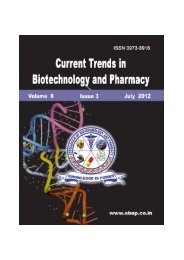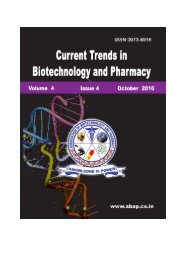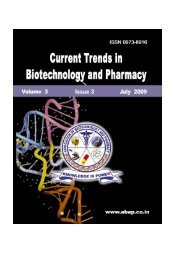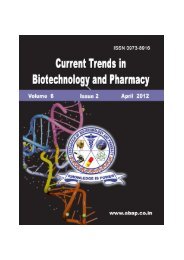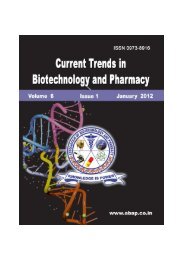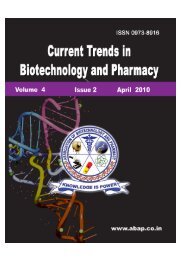April Journal-2009.p65 - Association of Biotechnology and Pharmacy
April Journal-2009.p65 - Association of Biotechnology and Pharmacy
April Journal-2009.p65 - Association of Biotechnology and Pharmacy
Create successful ePaper yourself
Turn your PDF publications into a flip-book with our unique Google optimized e-Paper software.
Current Trends in <strong>Biotechnology</strong> <strong>and</strong> <strong>Pharmacy</strong><br />
Vol. 3 (2) 138-148, <strong>April</strong> 2009. ISSN 0973-8916<br />
Withaferin A suppresses the expression <strong>of</strong> vascular endothelial<br />
growth factor in Ehrlich ascites tumor cells via Sp1 transcription<br />
factor<br />
Prasanna Kumar S., Shilpa P. <strong>and</strong> Bharathi P. Salimath*<br />
Department <strong>of</strong> Studies in <strong>Biotechnology</strong>,<br />
University <strong>of</strong> Mysore, Manasagangotri, Mysore-570006, India.<br />
For Correspondent : Salimathuom@rediffmail.com<br />
Abstract<br />
In the ayurvedic system <strong>of</strong> medicine, the<br />
medicinal plant, Withania somnifera Dunal<br />
(Solanaceae) finds application for numerous<br />
ailments including cancer. This herbal plant yields<br />
a host <strong>of</strong> steroidal lactones called withanolides,<br />
some <strong>of</strong> which have shown growth inhibition <strong>of</strong><br />
human tumor cell lines. Withaferin A amongst<br />
these withanolides reportedly is very active in<br />
impairing antitumor activity. However; the<br />
underlying molecular mechanisms <strong>of</strong> this activity<br />
remains still unclear. In the present study, we have<br />
shown that withaferin A inhibited vascular<br />
endothelial cell growth factor (VEGF) -induced<br />
tube formation by human umbilical vein endothelial<br />
cells (HUVECs) <strong>and</strong> angiogenesis in chick<br />
chorioallantoic membrane (CAM) assay. In<br />
Ehrlich ascites tumor (EAT) model, the animals<br />
treated with withaferin A suppressed in vivo, the<br />
peritoneal angiogenesis <strong>and</strong> microvessel density.<br />
When compared to the untreated animals, the<br />
withaferin A treated tumor bearing mice showed<br />
a decrease in the volume <strong>of</strong> ascites <strong>and</strong> tumor<br />
cell number. Quantitation <strong>of</strong> VEGF levels in ascites<br />
from withaferin A untreated or treated tumor<br />
bearing mice indicated decreased secretion <strong>of</strong><br />
VEGF in ascites from treated mice, as measured<br />
by ELISA. Studies at molecular level revealed<br />
that withaferin A inhibits binding <strong>of</strong> Sp1<br />
transcription factor to VEGF-gene promoter, in<br />
order to exert its antiangiogenic activity. These<br />
results clearly indicate the antiangiogenic potential<br />
<strong>of</strong> withaferin A in modulating antitumor activity.<br />
Keywords: Ehrlich ascites tumor; Withaferin<br />
A; Angiogenesis; Sp1, VEGF.<br />
Introduction<br />
Several natural compounds are recognized<br />
as cancer chemo preventive agents. Withanalides<br />
are especially well known to suppress tumor cell<br />
growth via cell-cycle arrest <strong>and</strong> by the induction<br />
<strong>of</strong> apoptosis in several tumor cell lines (1-3).<br />
Moreover, withaferin A inhibits endothelial cell<br />
proliferation <strong>and</strong> angiogenesis in vitro (4).<br />
Angiogenesis is essential for the growth,<br />
progression <strong>and</strong> metastasis <strong>of</strong> solid tumors (5).<br />
Withaferin A, a member <strong>of</strong> the withanalides family<br />
that is present at high levels in roots <strong>and</strong> leaves<br />
<strong>of</strong> Withania somnifera plant has been found to<br />
possess antioxidant <strong>and</strong> antitumor activity (6-9).<br />
However, the mechanism by which withaferin A<br />
suppresses angiogenesis has not been fully<br />
elucidated.<br />
Vascular endothelial growth factor (VEGF)<br />
is a major angiogenic factor that facilitates tumor<br />
growth <strong>and</strong> metastasis. Hypoxia is known to<br />
induce the expression <strong>of</strong> VEGF gene (10, 11).<br />
VEGF promoter analysis has revealed several<br />
potential transcription factor-binding sites, such<br />
as hypoxia-inducible factor-1(HIF-1), activator<br />
Sp1 transcription factor



